Action for Primates
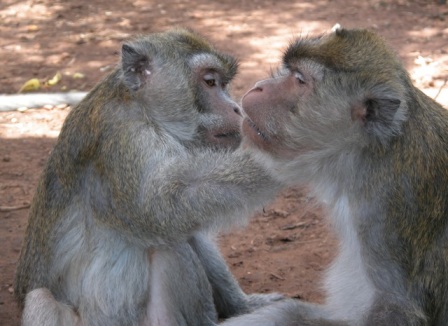
|
Action for Primates |

|
|
The following are news items we have posted in 2024. See elsewhere for news from other years.
Index of news items; select date & title to access:
30 December 2024: Taking action for non-human primates in 2024
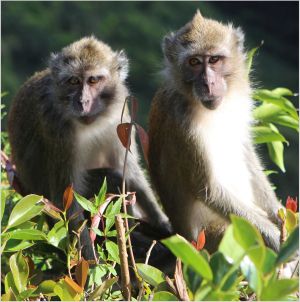
Action for Primates thanks all who have spoken up on behalf of non-human primates and supported our work throughout 2024. It has been a challenging year, as we continue in our efforts to end the appalling exploitation and persecution of non-human primates around the globe; the shocking number of monkeys traded for the research and toxicity testing industry; hunted and killed for 'fun', for food or simply because humans deem them to be 'pests'; others who are captured alive to be sold at markets, or are tormented and abused on camera for 'entertainment' on social media platforms. Our work has received important coverage in broadcast and print news media, helping to get our message out to millions of people.
It was an important year for action by law enforcement agencies against online monkey torture groups. In the UK, Sarah Kite, co-founder of Action for Primates, assisted the police with their investigations resulting in two landmark cases – the jailing of Holly LeGresley and Adriane Orme for their part in a global monkey torture ring on Telegram that paid for and ordered baby monkeys to be tortured and killed in Indonesia, and the jailing of Peter Stanley, convicted under the Obscene Publications Act for distributing extreme monkey torture videos on Facebook.
In the USA, several people have been convicted and imprisoned, including Ronald Bedra from Ohio. Investigations by Action for Primates and Lady Freethinker first uncovered the existence of the sadistic online monkey torture group – "Million Tears" – set up by Bedra, a former teacher, who put in motion paying for monkey torture through a depraved "monkey adoption scheme", in which members paid for monkeys to be filmed while being tortured through their chosen method. Together with Lady Freethinker, we continue to investigate the sadistic world of online monkey torture groups. We are also members of the Social Media Animal Cruelty Coalition (SMACC), a network of animal and wildlife protection groups from around the globe campaigning together to end the proliferation of animal cruelty content available on social media platforms.
The cruelty of the global trade, transportation and use of monkeys in research and toxicity (poisoning) testing continues to be a major concern for Action for Primates. There has been widespread interest in the plight of long-tailed macaques from SE Asia and Mauritius following the US Fish and Wildlife Service investigation into the trafficking of macaques from Cambodia to the USA for research and testing purposes. With the help of tip-offs and alerts from whistleblowers, Action for Primates, together with other animal groups, have continued to expose the secretive trade in monkeys, and those airlines responsible for transporting monkeys across the globe. Working with other wildlife and conservation groups, we continue to push for greater protection for long-tailed macaques at CITES (Convention on International Trade in Endangered Species of Wild Fauna and Flora).
We have exposed the appalling nature of the experimentation and toxicity testing to which tens of thousands of monkeys are subjected, including forcing them to become addicted to alcohol and other drugs such as cocaine; deliberately killing foetuses in the womb of pregnant monkeys in the name of dietary or drug abuse research; taking infants from their mothers and killing them in various research projects. Much of this sickening research takes place in the USA and is publicly funded through the National Institutes of Health. Thank you to everyone who has responded to our Action Alerts calling for such experiments to stop:
Non-human primates depend on us all to speak up and take action on their behalf. Please continue to speak out in 2025, and be a voice for them and encourage others to do likewise: http://actionforprimates.org/
Bluesky: @actionforprimates.bsky.social
X: @Action4Primates
Facebook
Instagram
28 December 2024: Further charges by US law enforcement in connection with online monkey torture groups
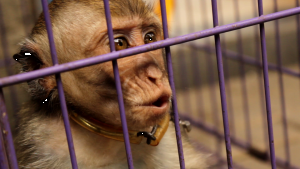
Action for Primates applauds the latest charges filed by US law enforcement against those involved in online monkey torture gangs. This action is part of an ongoing international effort by law enforcement agencies, which has already resulted in the conviction and imprisonment of several people in the USA, UK and Indonesia.
In recent weeks, charges of Conspiracy to Create and Distribute Animal Crushing Videos, in violation of 18 U.S.C. §§ 371 and 48(a)(2) and 48(a)(3) – the purpose of which was to fund, view, distribute, and promote animal crush videos depicting, among other things, the torture, murder, and sadistic mutilation of animals, specifically, juvenile and adult monkeys – have been filed against two people in the USA, Drexel Venero and Stacey Storey.
Drexel Venero has pleaded guilty and faces a maximum term of up to five years in prison. According to court documents, Venero conspired with others to administer a private online group and be a member of other private online groups on an encrypted messaging platform, for the purpose of creating and distributing animal crush videos using video operators and monkeys in other countries, including Indonesia, which would then be sent to the USA.
From around October 2021 to July 2022, Venero received about 100 electronic payments over the Internet from co-conspirators. He also sent money to co-conspirators as payments to video operators to create new animal crush videos. In April 2022, Venero sent a wish list
requesting the most horrific acts of violence and torture to be inflicted upon a monkey, including hammering the monkey's limbs and genitalia and crushing the monkey's head with a C-clamp. Overall, Venero claimed to have obtained 860 videos depicting monkey crushing and torture.
Stacey Storey, whose online names included Sadistic
and Sadistic Queen
, has yet to enter a plea. According to court documents, in June 2023, law enforcement seized Storey's electronic devices and found over 675 videos and 11,000 images depicting animal crushing. It is alleged that Storey received over US$2800 in payments from other group members to then forward to her contact in Indonesia to get videos made. One horrific video produced in April 2022 – for which it is alleged Storey organised payment – depicted the torture of a young monkey sealed inside a jar of fire ants. The monkey was eventually taken out of the jar and killed by sodomising him from the anus through his mouth with a stick.
Investigations by Action for Primates and Lady Freethinker first uncovered the existence of the sadistic online monkey torture group called Million Tears
. This group was set up by Ronald Bedra from Ohio, a former teacher, in 2021, working with people in Indonesia to facilitate monkey torture videos. Bedra put in motion the payment for monkey torture through a depraved monkey adoption scheme
, in which group members were invited to pay for their own private monkey
to be filmed while being tortured through their chosen method. Alternately, members could make smaller contributions towards a fee for their share
of what Bedra called a community monkey
. Group members could then put in requests for acts of cruelty and torture to be inflicted upon this shared
monkey and decide how the monkey was to be killed.
The torment and torture inflicted upon baby monkeys and paid for by these online monkey torture groups is truly horrifying, and the pain, suffering and distress caused, unimaginable. Evidence obtained during the Lady Freethinker and Action for Primates investigations was given to various law enforcement agencies and spurred the BBC investigation and documentary about online monkey torture gangs – "The Monkey Haters" – which helped lead to the inclusion of animal cruelty in the UK Online Safety Act.
Action for Primates and Lady Freethinker continue to investigate and work to end the horrifying abuse of monkeys for online content – sending intelligence and information to law enforcement, publishing reports and communicating directly with social media platforms. Both groups are also members of the Social Media Animal Cruelty Coalition (SMACC), a network of animal and wildlife protection groups from around the globe campaigning together to end the proliferation of animal cruelty content available on social media platforms.
15 November 2024: The hidden suffering of monkeys transported to Manchester Airport for UK testing labs
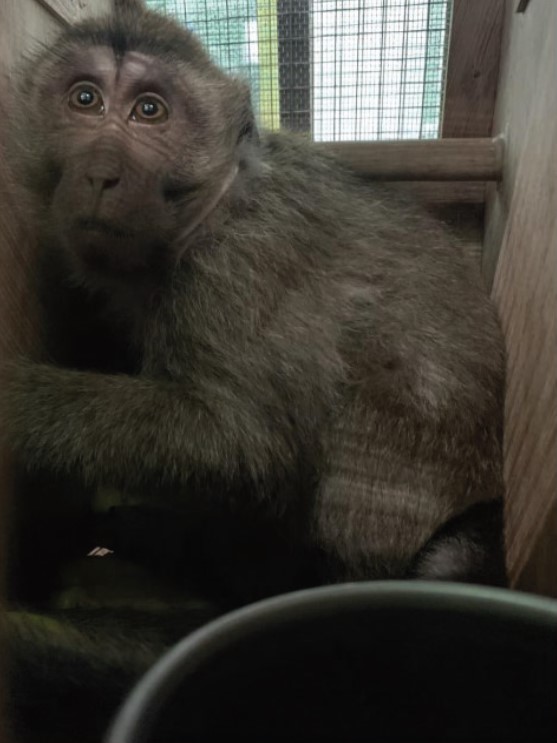
The hidden suffering of monkeys transported to the UK to be used in toxicity (poisoning) testing laboratories, has been revealed following the release of inspection reports and 'never-before-seen' photographs of monkeys inside transit crates destined for Manchester Airport. The findings have raised major animal welfare concerns, and renewed calls by animal protection groups – Cheshire Animal Rights Campaigns, Action for Primates and Animal Welfare Party – to the UK government and Manchester Airport to end the import of primates to the UK.
The reports and images were released to the Dutch-Belgian based organisation Animal Rights, following a freedom of information request submitted to Brussels Airport, a key transit hub for the global trade in monkeys. These reveal that thousands of long-tailed macaques, some just two years old, are transported as cargo on airlines to Brussels airport each year, primarily from Mauritius and Vietnam. In some cases, the monkeys continue by air from Brussels to the UK or the USA. Others are transported by road to laboratories and suppliers across Europe.
Monkeys destined for the UK are transported from Brussels by cargo carriers to Manchester Airport. On arrival, the monkeys are loaded onto a truck and driven by road to their final destination – one of several testing laboratories, primarily contract testing facilities. At these laboratories, the monkeys are subjected to toxicity tests, the main area in which long-tailed macaques are used.
The photographs show distressed monkeys, including those destined for the UK, cowering inside the small wooden crates used to transport them, while the inspection reports reveal disturbing situations, including:
...is too cold for the animals. The transport was, nevertheless, approved to fly to Manchester Airport.
Transportation by air is a stressful ordeal for monkeys, who may become so distressed that they can become ill or die in transit. Shipped as cargo, monkeys spend many hours confined singly in small transit crates, cruelly deprived of the companionship of others, whom they would normally hold onto for comfort under stressful conditions. Journey times to the final destination, including air and ground transit times, can be extremely long, and the monkeys may have to endure inadequate ventilation, unfamiliar and loud noise, extreme temperature fluctuations and delays en route.
Animal Welfare Party and Cheshire Animal Rights have been campaigning for Greater Manchester councils, who are stakeholders in Manchester Airport, to take a stand against the airport's role in the global primate trade. At the October 2023 Stockport Council meeting, Cllr Mark Hunter stated: I'm more than happy to work with any other council leaders of any stripe to do what we can to press Manchester Airport to cease this very poor and deplorable practice
.
Jane Smith, deputy leader, Animal Welfare Party, said: The import of live monkeys destined for UK vivisection laboratories brings shame on Manchester Airports Group plc, its council stakeholders and the North West region. We are calling on MAG plc to end this horrific practice immediately as part of the movement to consign testing on primates to the dustbin of history where it belongs.
Hannah Bell, Cheshire Animal Rights Campaigns, stated: For decades, there have been calls for Manchester Airport to stop accepting flights that import animals for laboratories and in particular primates. It is a secretive business that took years of investigating to uncover. Thanks to the latest expose, we can put a face to the clandestine "cargo" that the airport accepts – and that face is utterly heartbreaking, the suffering unacceptable. Manchester Airport must stop facilitating this trade and close its gateway to hell on shipments of monkeys imported for laboratories.
Sarah Kite, Co-founder, Action for Primates, stated: These distressing revelations and images have placed the secretive world of the primate research and toxicity testing industry firmly in the spotlight. Sentient and intelligent monkeys are being subjected to a terrifying and traumatic ordeal as they are shipped as cargo in small crates on long journeys across the world to the UK. This is a cruel and inhumane trade in monkeys' lives and we call upon the UK Government to end it.
Long-tailed macaques are intelligent and highly social non-human primates with unique cultures and behaviours. They contribute to biodiversity and play an important ecological role in their native ecosystems. Their conservation status was recently elevated to Endangered by the International Union for Conservation of Nature (IUCN) Red List of Threatened Species, reinforcing the importance of protecting the species.
14 November 2024: Jail for women in UK baby monkey torture case
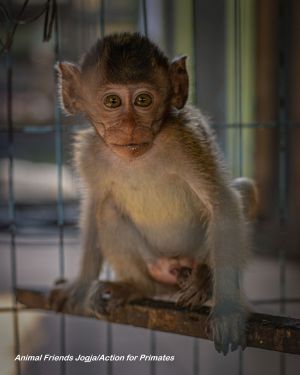
Two women have been imprisoned for their part in a global monkey torture ring that paid for and ordered baby monkeys to be tortured and killed in Indonesia to create videos to be circulated online. Holly LeGresley, who was sentenced to two years and Adriana Orme, who was sentenced to 15 months, both pleaded guilty to charges of publishing an obscene article and causing unnecessary suffering to a protected animal.
The sentences have been welcomed by animal protection groups Action for Primates and Lady Freethinker, who have spent over three years investigating the sadistic world of animal torture groups. The convictions are part of an international effort by law enforcement agencies in several countries, in particular the UK and the USA, to identify and prosecute those groups and individuals who facilitate the torture of baby monkeys. Several people in the USA are already serving prison sentences.
LeGresley and Orme were members of a Telegram group run by Michael Macartney from Virginia, USA, who called himself "the Torture King". Macartney, who was recently sentenced to three years and four months in prison for conspiring to make and distribute "animal crush" videos, ran several online Telegram groups that facilitated the 'torture, murder and sexually sadistic mutilation' of baby long-tailed macaques for 'fun'. LeGresley, who called herself "The Immolator", was an administrator of this group and even ran a poll for group members to vote on the method of torture they wanted to see inflicted upon a monkey for a video to be made, funded by the group. The choices included sealing a monkey inside a jar with red ants, applying a painful substance to the wounds created by a cheese grater or gluing together various parts of a monkey's body.
The perverted 'enjoyment' LeGresley and Orme obtained from watching baby monkeys brutally tortured and abused in the most sadistic ways is horrifying and evident in the sickening comments they made in group chats on Telegram:
Orme:I love mental torture. It's funny what you can reach and see how they change.
I would start fucking them up mentally, then slowly bit by bit physically, torture them, heal them, torture them, heal them. Keep them alive like this for as long as possible.
LeGresley:I feel very satisfied when I see monkeys suffer too. It makes me happy.
I like it, the little rat got sliced up good and proper, and it survived long enough to suffer! whats the point in just killing them? Thats no fun.
I wonder if they could simply lower a baby monkey into boiling water. I'd quite like to see one try to swim as it burns alive.
Members of these online torture groups are primarily active on platforms such as Telegram and get 'pleasure' from watching helpless and vulnerable infant monkeys – some just a few days old – in terror and pain fighting for their lives. The extreme cruelty inflicted upon the baby monkeys included being set alight; having parts of their body cut off, including limbs, genitals, fingers and toes; their bones broken with a hammer; their heads squeezed in a clamp; beaten viciously; and having their eyes drilled out with a power tool.
The evidence obtained during the investigations by Action for Primates and Lady Freethinker has been given to various law enforcement agencies and spurred the BBC investigation and documentary about online monkey torture gangs – "The Monkey Haters" – which helped lead to the inclusion of animal cruelty in the UK Online Safety Act.
Disturbingly, many graphic and violent videos paid for by members in Telegram groups – depicting extreme violence and sexual abuse inflicted upon baby monkeys, including genital mutilation – have appeared on mainstream social media platforms such as Facebook. By allowing these people to operate and post monkey torture content, social media companies are facilitating criminal activity on their platforms.
17 October 2024: Woman in Taiwan investigated for posting monkey torture videos on Facebook
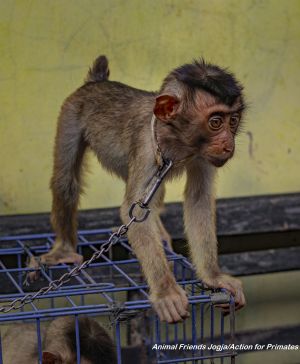
A woman in Taiwan has been criminally investigated for uploading monkey torture videos to Facebook. The investigation follows a report sent to the Taiwan Society for the Prevention of Cruelty to Animals (Taiwan SPCA) by Action for Primates and Lady Freethinker. After receiving the report, the Taiwan SPCA filed a complaint with the Taipei City Criminal Investigation Division, providing the evidence and requesting police intervention to investigate. The police located the perpetrator who admitted to obtaining 26 videos from Telegram and BiliBili and uploading them to Facebook groups. Her actions were in violation of Articles 25 and 27-1 of the Taiwanese Animal Protection Act, and she was fined and granted a deferred prosecution of one year.
Taiwan SPCA's Executive Director Connie Chiang stated: We are grateful to the authorities for their proactive handling of this case. Although these videos were not filmed in Taiwan, deliberately sharing them for others to watch encourages similar criminal behavior and should not be taken lightly.
Action for Primates and Lady Freethinker welcome the action taken by the authorities in Taiwan. We hope that the involvement of law enforcement will deter others from torturing monkeys, let alone posting similar obscene content on social media platforms. Meta and other social media companies must take immediate action to stop allowing these groups to operate and distribute animal torture content on their platforms.
In September 2024, a man in the UK was given a 20 month prison sentence after pleading guilty to charges under the Obscene Publications Act for distributing monkey torture videos on Facebook.
For further information: https://www.spca.org.tw/post/monkeyabusevideo-fb-investigation-en
3 October 2024: US man who called himself "Torture King" jailed in monkey torture case
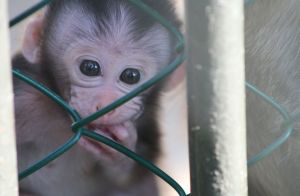
Action for Primates welcomes the jail sentence of three years and four months handed down to Michael Macartney, from Chesapeake, Virginia, after he pleaded guilty to conspiring to make and distribute videos showing monkey torture, otherwise known as "animal crush" videos. Calling himself "Torture King", Macartney ran several online Telegram groups that facilitated the torture and killing of baby monkeys for 'fun'.
Macartney was responsible for taking more than 300 payments between November 2021 and August 2022 for ideas – involving the "torture, murder and sexually sadistic mutilation" of long-tailed macaques – which he would send to perpetrators in Indonesia who filmed the torture and killing and sent videos back to the group. He even raised extra funds to give bonus payments when the group were especially pleased by a particular video, such as one that involved the torturing of a monkey to death using a jar of ants.
Two women in the UK – Adriana Orme and Holly LeGresley, who are awaiting sentencing after pleading guilty to charges relating to facilitating the torture of monkeys – were members of Michael Macartney's Telegram groups. LeGresley, who called herself "The Immolator", was an administrator of the group, and ran a poll for group members to vote on the method of torture they wanted to see inflicted upon a monkey for a video to be made, funded by the group. The choices included sealing a monkey inside a jar with red ants; applying a painful substance to wounds created by a cheese grater; or gluing together various parts of a monkey's body.
Action for Primates and Lady Freethinker first exposed the sadistic world of online monkey torture groups in 2021, and since then have continued to investigate those individuals involved. Our evidence and information have been given to various law enforcement agencies and spurred the BBC investigation and documentary about online monkey torture gangs – "The Monkey Haters". At least nine people involved in monkey torture groups have now pleaded guilty or been sentenced in the USA, including Ronald Bedra from Ohio, a former teacher, and pharmacist Kenneth Herrera from Wisconsin, who were involved in a sadistic online group called "Milliontears". Bedra, who set up this group, put in motion paying for monkey torture through a depraved "monkey adoption scheme", in which group members were invited to pay for their "own private monkey" to be filmed while being tortured through their chosen method. Alternately, members could make smaller contributions towards a fee for their "share" of what Bedra called a "community monkey". Group members could then put in requests for acts of cruelty and torture to be inflicted upon this "shared" monkey and decide how the monkey was to be killed. The torment and torture inflicted upon baby monkeys and paid for by the "Milliontears" group was horrifying.
25 September 2024: UK man receives jail sentence for posting monkey torture videos on Facebook
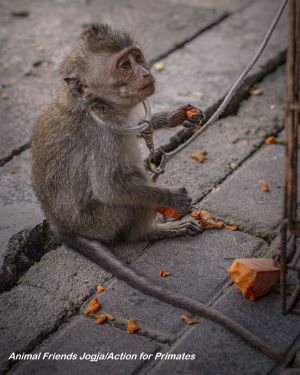
Action for Primates and Lady Freethinker have welcomed the prison sentence given to Peter Stanley today at Liverpool Crown Court, after he pleaded guilty to charges under the Obscene Publications Act for distributing monkey torture videos on Facebook. The videos posted online by Stanley depicted extreme violence and sexual abuse inflicted upon baby monkeys, including genital mutilation. We hope this prosecution and punishment will be an important deterrent to others, and a wake-up call to Meta and other social media companies that continue to allow this highly disturbing animal torture and killing content to be posted on their platforms.
Sarah Kite, Co-founder, Action for Primates, who alerted the police about Peter Stanley, stated: We are very grateful to Merseyside Police for taking this action. Individuals, such as Peter Stanley, involved in distributing obscene content depicting the sadistic torture and killing of baby monkeys, need to know that there are legal consequences to their perverted behaviour.
Nina Jackel, Lady Freethinker Founder, stated: I applaud the court for prosecuting this case, which is just one among an epidemic of brutal baby monkey torture on Facebook as well as encrypted message services such as Telegram. I hope this sentence sends a message to others who continue to distribute such horrific content online and believe there will be no consequences. This era of animal torture on social media must end.
Monkey torture videos have been increasing on social media in recent years. The degree of extreme violence to which monkeys are subjected for content to post for 'entertainment' has also escalated. Examples include infant monkeys having parts of their bodies, including limbs, genitals, fingers and toes, broken or cut off; eyes drilled out with a power tool; and being set alight. One danger of allowing the circulation of these extreme graphic videos on social media is that it normalises violence towards animals. Social media companies are providing a space for depraved individuals to get together and share content that depicts highly sadistic, grotesque and perverted behaviour.
Peter Stanley belonged to several groups on Facebook dedicated to distributing videos depicting the torture of monkeys. In these groups, Stanley posted videos involving infant macaques, some just a few weeks old, brutalised in extreme and sadistic ways for online 'entertainment'. The videos were also accompanied by sickening comments posted by Stanley, making light of the monkeys' suffering and distress.
Action for Primates and Lady Freethinker have spent over three years investigating the sadistic world of animal torture videos. Our evidence and information have been given to various law enforcement agencies and spurred the BBC investigation and documentary about online monkey torture gangs – "The Monkey Haters" – which helped lead to the inclusion of animal cruelty in the UK Online Safety Act. Both animal groups are also members of the Social Media Animal Cruelty Coalition (SMACC), a network of animal and wildlife protection groups from around the globe campaigning together to end the proliferation of animal cruelty content available on social media platforms.
https://www.merseyside.police.uk/news/merseyside/news/2024/september/man-jailed-for-publishing-monkey-torture-online/
12 September 2024: Concern that monkeys from Angkor Wat temple in Cambodia will end up in farms which export to laboratories
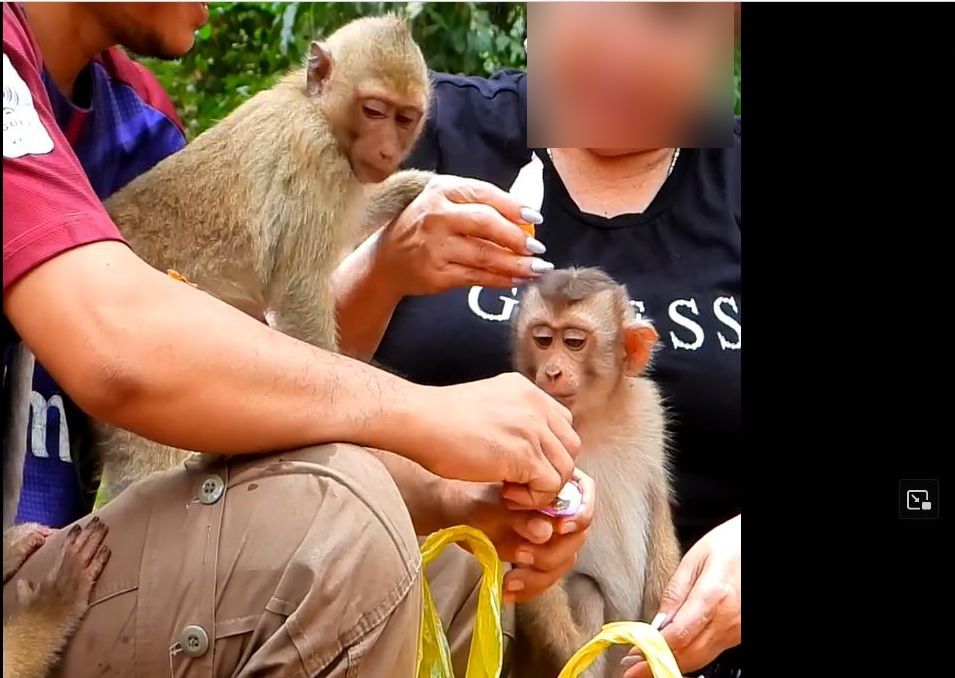
Action for Primates is raising concerns over the fate of the free-living monkeys at the Angkor Wat temple complex following reports that the Ministry of Agriculture, Forestry and Fisheries intends to carry out a census of the monkeys (https://www.phnompenhpost.com/national/fia-to-conduct-nationwide-monkey-census-aims-to-curb-biting-incidents). The authorities have stated they will catch individuals considered to pose a 'risk to humans' in order to relocate them or send them to breeding farms. Action for Primates is concerned that these monkeys are 'paying the price' for the many years of inaction by the authorities to put an end to treating the monkeys as a tourist attraction. The government have allowed the monkeys to become habituated to people, in particular through feeding. As a result, the monkeys now aggressively seek food from people, something they would not normally do. Further, video operators have been allowed to interfere with the wild troops in order to create online content to post on social media platforms, often for money. Cambodia is one of several countries in SE Asia to export thousands of long-tailed macaques every year for the global research and toxicity (poisoning) testing industry.
Sarah Kite, Co-founder, Action for Primates, stated: The monkeys at Angkor Wat are paying the price for inappropriate and preventable human behaviour. The deliberate interference and harassment by video operators for online 'entertainment' is inhumane and unacceptable. There is an urgent need for a humane management plan to be put in place. Capturing and separating individuals from their family and social troops is not humane and will not be effective in the long run. Sending them to breeding farms is exceptionally cruel.
Action for Primates, together with Lady Freethinker and Stop Monkey Abuse Asia, have regularly sent reports and letters of concern to APSARA National Authority in Cambodia and the United Nations Educational, Scientific and Cultural Organization (UNESCO), calling for an end to the inhumane, unlawful exploitation and harassment of troops of wild macaques living at the UNESCO World Heritage Site by video operators and others.
Most recently, the groups identified and submitted a list to APSARA of YouTube channels and Facebook pages that belong to a team of video operators at Angkor Wat involved in the worse mistreatment of and interference with the monkeys at Angkor Wat. This included videos that show interference with infants and females; physical abuse and other mistreatment of monkeys; feeding and handling of monkeys, including encouraging tourists to do so; and abandoning monkeys kept as 'pets'. The latter monkeys, who are not part of the established troops, are at risk of serious injury and death. The people involved have created an "industry" of following and filming the macaques for the sole purpose of making a profit from "entertainment" at the monkeys' expense. The videos posted on social media platforms are often monetised and have requests for donations to feed or help the monkeys. The operators are only interested in creating 'drama' for filming rather than looking out for the welfare of the captive individuals.
In addition to the harassment of the monkeys and the deliberate interference and disruption to their social groups, there are serious concerns that the monkeys have been exploited as a tourist attraction with visitors encouraged to mix with and hand feed the animals. Although wild non-human primates are typically fearful of human beings, the artificial feeding of the macaques at Angkor Wat has habituated the macaques to people so that they are less fearful than normal and view them as a source of food. The harassment of the macaques by the video operators and their behaviour in encouraging tourists to feed and handle the monkeys serve to create even more potential for aggression so that the public will be at increased risk of attack and injury.
For the sake of the macaques and the safety of the public, Action for Primates, Lady Freethinker and Stop Monkey Abuse Asia have regularly urged APSARA to intervene to stop this inhumane and irresponsible behaviour. There continues to be an urgent need for a humane management plan to be put into place, part of which should include action taken against those people responsible for the mistreatment of monkeys, as well as the strict enforcement of a prohibition of people interacting with and feeding the monkeys. The monkeys are not the problem in this situation; rather, it is the public.
The macaques in question are intelligent, adaptable and social non-human primates with unique cultures and behaviours. They contribute to biodiversity and play an important ecological role in their native ecosystems. In the case of the long-tailed macaque, there has been a critical new development regarding its conservation status, reinforcing the importance of protecting the species. The conservation status has been elevated to Endangered by the International Union for Conservation of Nature (IUCN) Red List of Threatened Species in 2022 (https://www.iucnredlist.org/species/12551/221666136).
6 September 2024: Animal protection groups call for investigation into role of Telegram in facilitating monkey torture groups
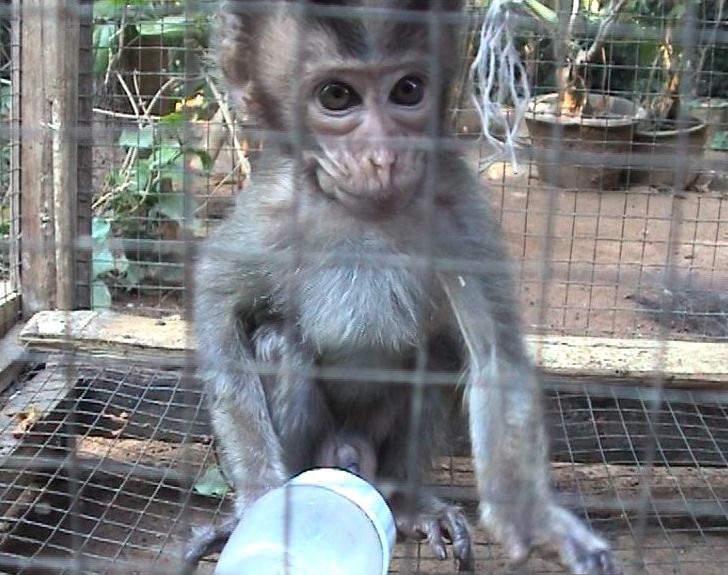
French authorities, in connection with an investigation into crimes related to child pornography, drug trafficking and fraudulent transactions on the platform, arrested Pavel Durov, the founder of the messaging app Telegram. Animal protection groups Lady Freethinker and Action for Primates are also calling for an investigation into the role of Telegram as a hub for global animal torture rings.
In particular, the animal groups highlight the role of Telegram in facilitating the torture and killing of baby monkeys for online 'entertainment'. Monkey torture gangs that have established themselves on Telegram are responsible for developing extreme torture methods, collecting money from members and then commissioning people in Indonesia and other countries to carry them out. These people get 'pleasure' from watching helpless and vulnerable infant monkeys – some just a few days old – in terror and pain fighting for their lives. The extreme cruelty inflicted upon the baby monkeys include being doused in flammable liquid and set alight; having parts of their body cut off, including limbs, genitals, fingers and toes; having their bones broken with a hammer; having their heads squeezed in a clamp; being beaten viciously; and having their eyes drilled out with a power tool.
Action for Primates and Lady Freethinker have spent three years investigating the disturbing world of online animal torture. Some of the sadistic and perverted behaviour displayed by group members on Telegram is not only cruel, but are unlawful, and law enforcement agencies in the USA and the UK have taken action against several people. In the USA, individuals have been charged with creating and distributing "animal crush" videos, which is a federal crime punishable by up to seven years in prison under the Preventing Animal Cruelty and Torture Act (PACT Act). Some members have already been convicted and imprisoned, including Kenneth Herrera, a Wisconsin pharmacist, sentenced to one year in prison for creating, selling and distributing an animal crushing video. Attorney Philip Colt Moss has, together with Nicholas Dryden and Giancarlo Morelli, been charged with conspiracy to create and distribute "animal crush" videos. All three are awaiting trial. Videos alleged to have been created as part of the conspiracy included depictions of monkeys having their genitals burned; having their genitals cut with scissors; being sodomised with a wooden skewer; and being sodomised with a spoon.
In the UK, two women – Holly LeGresley and Adriana Orme – who were also members of a global monkey torture group run by an individual who called himself 'TortureKing', have pleaded guilty to charges of publishing an obscene article by uploading images of monkey torture and causing unnecessary suffering to a protected animal. The women were part of a group on Telegram that shared ideas for custom-made torture videos. They are waiting to be sentenced. In April 2024, 'TortureKing' himself – Michael McCartney of Virginia – pleaded guilty to conspiracy to create and distribute animal crushing videos.
Lady Freethinker and Action for Primates are urging authorities to investigate the role of Telegram in enabling these disturbing monkey torture groups. By allowing individuals and groups to operate for months, even years, on its platform, Telegram is enabling animal cruelty fetishists to connect and escalate their cruel and illegal activities to sickening levels.
21 August 2024: Second woman pleads guilty in UK monkey torture case
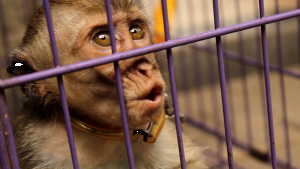
A second woman in the UK has pleaded guilty to charges of consuming, causing and facilitating the torture of monkeys. Adriana Orme, who appeared in Worcester Crown Court on 19th August 2024, was part of a global monkey torture ring that paid for and ordered baby monkeys to be tortured and killed in Indonesia to create videos to be circulated online. Her co-defendant in the UK, Holly LeGresley, pleaded guilty on 7th May 2024. The women, accused of publishing an obscene article by uploading videos depicting monkeys being tortured, and also of encouraging or assisting the commission of unnecessary animal suffering by making payments, will be sentenced in October 2024.
LeGresley, who called herself "The Immolator", even ran a poll for group members to vote on the method of torture they wanted to see inflicted upon a monkey for a video to be made, funded by the group. The choices included sealing a monkey inside a jar with red ants, applying a painful substance to wounds created by a cheese grater or gluing together various parts of a monkey's body.
Action for Primates and Lady Freethinker first exposed the sadistic world of online monkey torture groups in 2021, and since then have continued to investigate those individuals involved. Our evidence and information have been given to various law enforcement agencies and spurred the BBC investigation and documentary about online monkey torture gangs – "The Monkey Haters".
Sarah Kite, co-founder, Action for Primates, stated: These videos contain the most horrifying content I have encountered in my many years of working in animal protection. For people to think up methods of torturing helpless and vulnerable baby monkeys is beyond comprehension. To then pay for someone to inflict such extreme violence is so disturbing that I believe the people involved must permanently be barred from having contact with human children or non-human animals.
Nina Jackel, Founder, Lady Freethinker, stated: The depraved acts being inflicted on baby monkeys for online videos are sickening, and anyone involved in creating or distributing such vile content must face consequences. Accountability from the court is essential for deterring potential future offenders and sending a clear message that animal torture will be treated as a serious crime.
We are grateful to the UK police for taking action against those individuals involved in monkey torture groups. Anyone involved in this type of behaviour must be held to account, and we hope their prosecution and punishment will act as a deterrent to others. The charges are part of an international effort by law enforcement agencies to prosecute those groups and individuals who facilitate the torture of baby monkeys. At least 20 people across the globe are being investigated, and several in the USA and Indonesia have already been convicted and imprisoned.
Members of these torture groups are primarily active on platforms such as Telegram and get 'pleasure' from watching helpless and vulnerable infant monkeys – some just a few days old – in terror and pain fighting for their lives. The extreme cruelty inflicted upon the baby monkeys include being doused in flammable liquid and being set alight; having parts of their body cut off, including limbs, genitals, fingers and toes; having their bones broken with a hammer; having their heads squeezed in a clamp; being beaten viciously; and having their eyes drilled out with a power tool.
Shockingly, graphic and violent videos continue to be posted on other platforms, such as Facebook, making such content easily available for others, including children, to access and view. Lady Freethinker and Action for Primates are calling on all social media and video sharing platforms to take immediate action to stop all animal torture content from being posted online.
10 July 2024: New report reveals short, tragic lives of two baby monkeys tortured and abused for Facebook videos
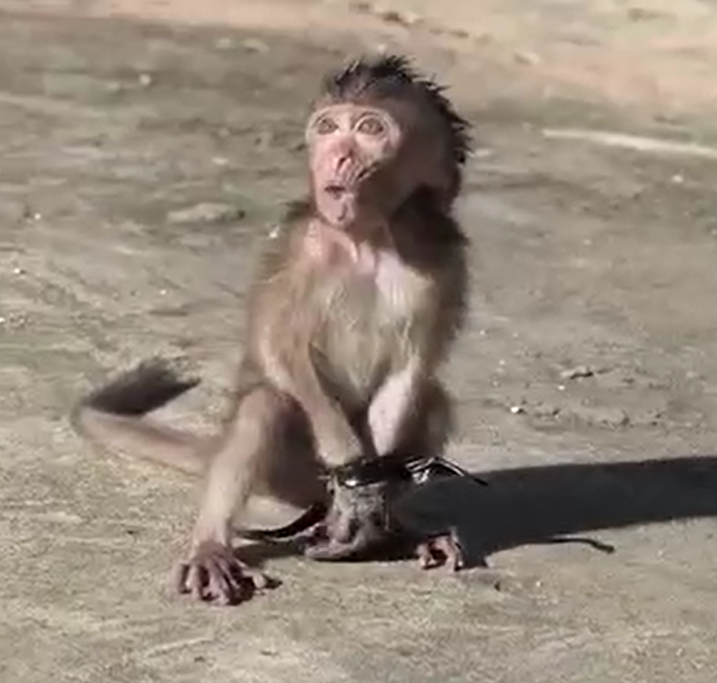
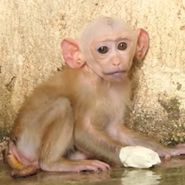
A new report from Action for Primates and Lady Freethinker has exposed the tragic short lives of two baby monkeys – named Garina and Luna – who over weeks and months were ruthlessly tormented, psychologically abused, endured extreme cruelty, and were ultimately killed for social media content. Multiple, harrowing videos of their suffering and distress have been posted for "entertainment" on numerous Facebook profiles, groups, or playlists – and sickening torture videos showing their distress, torment and abuse continue to be posted regularly. Facebook viewers who identify as "monkey haters" watch their suffering and despair with sadistic pleasure.
Action for Primates and Lady Freethinker are urging Facebook parent company Meta to remove and block all content depicting such horrific animal abuse.
Garina and Luna were held captive by the same person, who subjected them to similar abuse and torture, including physically and sexually assaulting them with his hands, thorny cactus or crabs. Their fur was shaved, their hands and feet were bound so they could not move, eat or drink; sticky tape was used to bind them to other animals, including monkeys; they were subjected to prolonged and aggressive blasts of cold water; they were violently shaken, held underwater and buried up to their necks in mud; they were set upon by dogs.
Dr Nedim Buyukmihci, a veterinarian and co-founder of Action for Primates, stated: These vulnerable infant macaques were placed in extremely frightening situations; were physically harmed by severe restraint and injuries by other animals; and were emotionally and physically brutalised over a period of time. Their facial expressions and their clinging onto each other is visual evidence of their extreme distress. Physical injuries comprising facial wounds, for example, are evident. Further, these infant monkeys were 'broken' psychologically by the continual daily torture methods creating a state of learned helplessness in which an individual internalises pain and suffering because they have 'learned' that attempts at avoidance do not bring relief.
What the people are doing to these infant monkeys is particularly disturbing. It is untenable that Meta should tolerate the existence of such individuals and groups on its platform, not only because of the horrifying nature of the atrocities being inflicted upon non-human primates, but also because of the harmful and damaging impact the viewing of such content will have on people, especially children.
Facebook promotes animal torture by failing to identify, through its own monitoring systems, and remove such content, and by failing to remove such content when torture videos have been reported to the company. Twenty-five percent of the Facebook sites represented in the report were previously reported to Meta by Lady Freethinker and Action for Primates – but the sites and torture videos remain active and available to anyone to access and view, including children.
Lady Freethinker and Action for Primates have sent this report directly to Meta. To date, there has been no response of any kind.
What you can do:
25 May 2024: Former teacher pleads guilty in US baby monkey torture case
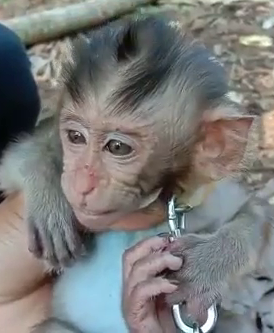
Action for Primates welcomes prosecution of Ronald Bedra from Ohio, who was involved in horrifying violence against baby monkeys. The former teacher – who resigned from the school district just weeks before his federal case was filed in court – pleaded guilty for his role in creating and distributing videos of baby monkeys being brutally tortured.
An investigation by Action for Primates and Lady Freethinker first uncovered the existence of the sadistic online monkey torture group called Milliontears
. This group was set up by Bedra and others in 2021, working with people in Indonesia to facilitate monkey torture videos. The evidence we uncovered, including videos and screenshots of chats from him and other group members, was handed over to the USA authorities.
Bedra, who went by the username DemonSword SoulDestroyer
, set in motion paying for monkey torture through a depraved monkey adoption scheme
, in which he invited group members to pay for their own private monkey
to be filmed while being tortured through their chosen method. Alternately, members could make smaller contributions towards a fee for their share
of what Bedra called a community monkey
. Group members could then put in requests for acts of cruelty and torture to be inflicted upon this shared
monkey and decide how the monkey was to be killed. The torment and torture inflicted upon baby monkeys and paid for by the Milliontears
group was horrifying (https://www.independent.co.uk/asia/southeast-asia/youtube-group-monkey-torture-indonesia-b1900135.html).
According to court documents, Bedra conspired with others to create and distribute videos which depicted acts of sadistic violence against baby and adult monkeys, including having digits and limbs severed and being forcibly sodomized with a heated screwdriver
(https://www.justice.gov/opa/pr/ohio-man-pleads-guilty-creating-and-distributing-videos-depicting-monkey-torture-and). No sentencing date has yet been set.
Action for Primates applauds the action by law enforcement to investigate and prosecute this case. The action is part of an international effort by law enforcement agencies in the USA, UK and Indonesia to identify and prosecute those groups and individuals who facilitate the torture of baby monkeys. Several people in the UK have been charged (https://tinyurl.com/yv67wf3z). In the USA and Indonesia, others have been convicted and imprisoned.
Action for Primates and Lady Freethinker continue to investigate and work to end the horrifying abuse of monkeys for online content – sending intelligence and information to law enforcement, publishing reports and communicating directly with social media platforms.
7 May 2024: British woman pleads guilty in monkey torture case

A British woman, Holly LeGresley, has pleaded guilty at Worcester Magistrates' Court to charges of consuming, causing and facilitating the torture of monkeys. She was part of a global monkey torture ring that paid for and ordered baby monkeys to be tortured and killed in Indonesia to create videos to be circulated online. She will be sentenced on 7th June.
LeGresley, who called herself 'The Immolator', even ran a poll for group members to vote on the method of torture they wanted to see inflicted upon a monkey for a video to be made, funded by the group. The choices included sealing a monkey inside a jar with red ants, applying a painful substance to the wounds created by a cheese grater or glueing together various parts of a monkey's body.
Action for Primates, a UK-based project that advocates globally on behalf of non-human primates, and Lady Freethinker, a US-based animal protection organisation, have spent three years investigating the sadistic world of animal torture videos. Our evidence and information have been given to various law enforcement agencies and spurred the BBC investigation and documentary about online monkey torture gangs – "The Monkey Haters" – which helped lead to the inclusion of animal cruelty in the UK Online Safety Act.
Lady Freethinker and Action for Primates commend UK law enforcement for taking on this disturbing subject and welcome the charges brought by West Mercia police force. Any individual involved in facilitating such heinous animal cruelty should be prosecuted to the fullest extent of the law.
The charges are part of an international effort by law enforcement agencies to tackle those groups and individuals who facilitate the torture of baby monkeys. At least 20 people across the globe are being investigated, and several in the USA and Indonesia have already been convicted and imprisoned.
Members of these torture groups are primarily active on platforms such as Telegram and get 'pleasure' from watching helpless and vulnerable infant monkeys – some just a few days old – in terror and pain fighting for their lives. The extreme cruelty inflicted upon the baby monkeys included being set alight; having parts of their body cut off, including limbs, genitals, fingers and toes; their bones broken with a hammer; their heads squeezed in a clamp; beaten viciously; and having their eyes drilled out with a power tool.
Sarah Kite, spokesperson for Action for Primates, and who assisted the UK police with their investigation, stated: Such extreme cruelty and depravity must never be tolerated. Anyone involved in this type of behaviour must be held to account, and others need to know that such behaviour will never be tolerated.
Nina Jackel, Founder, Lady Freethinker, stated: The horrors being inflicted on innocent, baby monkeys for online videos are sickening, and strong actions must be taken to protect animals from such brutality at the hands of humans. Those involved in the creation or distribution of animal torture content for 'enjoyment' pose a threat to both animals and humans, and they must be held accountable.
Shockingly, there are also monkey torture groups on the world's top social media platforms, and many of these graphic videos – depicting mutilation, burning, beating and more – have also been posted on Facebook, making them easily available for others, including children, to access and view. By allowing these people to operate and post monkey torture content, social media platforms have enabled and continue to enable animal cruelty fetishists to connect and escalate their cruel activities to extreme and grotesque levels. Lady Freethinker and Action for Primates are calling on social media and video sharing platforms to take immediate action to stop the proliferation of animal torture content that is being posted online.
A second woman – Adriana Orme – chose not to enter a plea at this stage and will appear in court again on 5th June.
6 May 2024: MeWe takes action to tackle online monkey torture content
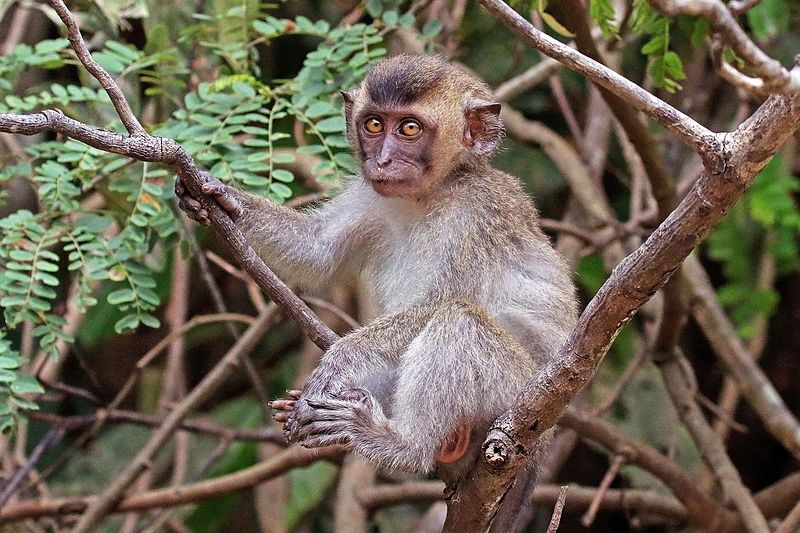
Action for Primates and Lady Freethinker have welcomed the commitment by MeWe to remove animal torture content from its platform. MeWe, the global social media and social networking service, with 20-million users worldwide, responded promptly and positively after being alerted to the circulation on its platform of graphic and horrifying videos depicting baby monkeys being tortured and killed.
In a statement released by MeWe, the company said: MeWe is thrilled to be recognized by Action for Primates and Lady Freethinker for our efforts in removing animal torture content from our platform and for working to create a better online environment for our users. Their mission to protect primates from harm and exploitation exactly aligns with our commitment to ethical moderation practices. We would like to extend our gratitude too for their advocacy and the great work that they do protecting primates worldwide.
Action for Primates and Lady Freethinker recognise the difficulties faced by social media platforms and apps as perverted individuals and groups search for new ways to circulate their despicable videos. A prompt response and effective means of dealing with concerns and complaints about this horrific content is vital, which is why we are publicly acknowledging the important efforts and commitment by MeWe to tackle this disturbing issue.
29 April 2024: TeleGuard removes monkey torture content from platform

Action for Primates has welcomed the swift action by TeleGuard in removing groups and individuals involved in the promotion and distribution of monkey torture content from their platform.
Action for Primates and Lady Freethinker had raised concerns with Teleguard, the messenger app, after finding the presence of highly graphic and disturbing videos of baby monkeys being tortured and killed. The videos were clearly breaching the platform's terms of use.
In response to the discovery of such horrific content on their platform, TeleGuard stated that We abhor such atrocities and in no way want TeleGuard to be misused for this purpose
and We find it morally indefensible and abhorrent and will NEVER tolerate something like that here at TeleGuard.
Action for Primates and Lady Freethinker continue to investigate the sadistic and disturbing abuse of monkeys for social media content. We are extremely grateful to TeleGuard for responding to our alert, and for their commitment to stop such videos from being circulated on its app. We urge other social media platforms to police their own guidelines rigorously and proactively, as well as to respond promptly and effectively to complaints, to help remove the incentives for people to commit and film these despicable acts of cruelty.
22 April 2024: Global macaque supply industry under the spotlight during Cambodia monkey smuggling trial

The jury at the Cambodian monkey trafficking trial in Florida recently acquitted Masphal Kry on conspiracy and smuggling charges. The charges, brought by the US Department of Justice, resulted from a US Fish & Wildlife Service (USFWS) investigation into monkey trafficking, during which it was revealed that wild long-tailed macaques in Cambodia were being falsely labelled as captive-bred for export to the USA. Kry, who was a government official at the Cambodian Forestry Administration when he was arrested, is the first individual to stand trial. Other indicted individuals, including the owner and several staff of Vanny BioResearch, the macaque supplier in Cambodia at the centre of the smuggling case, are now considered to be fugitives and still face trial.
The court heard a compelling account from a USFWS confidential informant. It was also shown disturbing videos of distressed wild-captured monkeys being delivered to Vanny BioResearch in nylon bags. One USFWS agent told the court that he tracked individual monkeys captured in the wild and who had been delivered to Vanny BioResearch in Cambodia. These monkeys were then exported to the USA.
Several USA companies involved in the import, supply and use of macaques in research and toxicity (poisoning) testing, including Orient BioResource Center and Envigo Global Services, subsequently received subpoenas requiring they produce documents and information relating to the import of non-human primates into the USA.
Although Kry was acquitted, in the course of the trial, damning evidence was heard of the relentless pursuit of long-tailed macaques where there is little to no morality surrounding how monkeys are obtained. Vanny BioResearch is a major supplier of monkeys to the USA prior to the charges brought by the Department of Justice. Unable to breed enough long-tailed macaques to supply demand from the USA import and user companies, it was claimed that the company started to illegally source wild-caught monkeys and label them as captive-bred to export instead.
Action for Primates has been raising concerns for many years about the global trade in long-tailed macaques – including the cruelty and suffering inflicted upon the individuals and the questionable validity of captive breeding claims. Long-tailed macaque farms focused within Southeast Asia, in particular in Cambodia, have rapidly developed and become industrial-scale enterprises, with hundreds of thousands of macaques exported in recent years.
24 March 2024: Individuals in UK charged in monkey torture case

Two women, Holly LeGresley of Kidderminster and Adriana Orme of Upton-upon Severn, have both been charged with publishing an obscene article and causing unnecessary suffering to a protected animal.
The charges are in relation to causing, consuming and facilitating the torture of monkeys.
The women have been bailed to appear in Court in May 2024.
More information: https://www.bbc.co.uk/news/articles/czkzn5k9d12o
15 March 2024: Major Cambodian macaque trafficking trial starts in USA
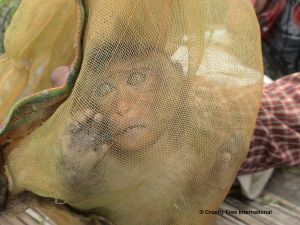
A Cambodian monkey trafficking trial began in Florida this week. It follows the filing of charges by the US Department of Justice (DoJ) against Cambodian wildlife officials and the owner and several staff from Vanny Bio-Research, a major macaque supplier in Cambodia. The charges of smuggling and conspiracy to violate the Lacey Act and the Endangered Species Act follow a major investigation by the US Fish and Wildlife Service (USFWS) into the global trafficking of long-tailed macaques (Macaca fascicularis) into the USA for research and toxicity (poisoning) testing. Masphal Kry, who is now on trial, was a government official at the Cambodian Forestry Administration when he was arrested in November 2022 at JFK Airport en route to an international CITES wildlife conference. The indictments have already received widespread international news media attention, and the trial will place the global trade in long-tailed macaques for the USA research and toxicity testing industry under the spotlight.
The DoJ allege that Kry and seven other individuals were part of an international macaque smuggling ring selling wild-caught long-tailed macaques falsely stated to be captive bred at Cambodian facilities for export to the USA. According to the DoJ, assistance was provided by the CITES authority in Cambodia and the Ministry of Agriculture, Forestry and Fisheries to deliver wild-caught macaques taken from national parks and protected areas in Cambodia to help make up for a shortage of 'suitable' monkeys for export. The wild-caught macaques were taken to breeding facilities and provided with false CITES export permits.
A USA government confidential informant, who had worked at Vanny Bio-Research for several years, documented the delivery of thousands of wild-caught monkeys to the facility. The court has been given harrowing accounts and has watched video footage taken during the USFWS investigation.
Several USA companies involved in the import, supply and use of macaques in research and toxicity testing, including Orient BioResource Center and Envigo Global Services, subsequently received subpoenas requiring they produce documents and information relating to the import of non-human primates into the USA.
Action for Primates has been raising concerns for many years about the global trade in long-tailed macaques – including the cruelty and suffering inflicted upon the individuals and the questionable validity of captive breeding claims. Long-tailed macaque farms focused within Southeast Asia, in particular in Cambodia, have rapidly developed and become industrial-scale enterprises, with hundreds of thousands of macaques exported in recent years.
In 2022, the long-tailed macaque was uplisted to Endangered on the International Union for Conservation of Nature (IUCN) Red List of Threatened Species. This new conservation status assessment was based on the degree of exploitation of the species, including their trade for research and toxicity testing, as 'pets', for 'entertainment', for human consumption and killing because of negative interactions with people. These, together with ongoing habitat destruction, are decimating wild populations of long-tailed macaques.
28 February 2024: Mauritius reports major increase in monkey exports during 2023
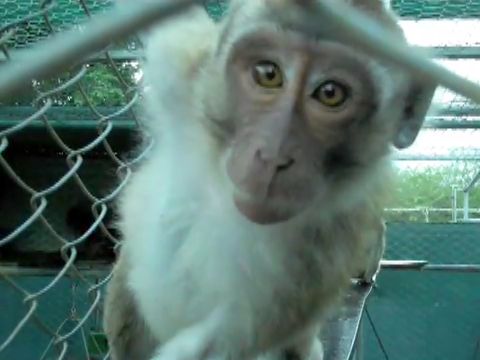
Mauritius reported exporting 15,907 long-tailed macaques in 2023, including to the USA (11,014), Spain (1,879), the UK (1,753), France (440) and Israel (11). This represents a substantial increase over 2022, when 11,897 long-tailed macaques were exported. The monkeys were destined for the research and toxicity (poisoning) testing industry.
In 2023, Mauritius also took the place of Cambodia and became the main exporter of monkeys to the USA, including almost 2,500 of whom had been captured in the wild. This follows restrictions placed on the trade from Cambodia to the USA in 2023, following the US Fish and Wildlife Service investigation into the global trafficking of long-tailed macaques.
The capture of wild monkeys is an inhumane practice, universally recognised as cruel because of the forced removal of the monkeys from their habitat and families. Several official bodies and organisations, including the European Union (European Union 2010) and the International Primatological Society (IPS 2021), recognise the suffering involved in this practice and, since 2013, the EU has prohibited the use of wild-caught primates in experiments.
Long-tailed macaques are the primary non-human primate used in toxicity testing, which is the deliberate poisoning of animals to see whether and how much of a chemical or drug it takes to cause them serious harm or death. They are forcibly restrained and a test substance given by injection, infusion, stomach tube or aerosol – in increasing amounts to measure the poisoning effects. All individuals alive at the end of each test are killed.
References:
17 February 2024: Indonesian suspect arrested for torturing and killing baby monkeys and selling the videos online

Action for Primates and Lady Freethinker welcome action taken by West Kalimantan Police in Indonesia, in the arrest of an individual suspected of torturing and killing baby monkeys on camera and selling the videos to buyers in the USA and abroad for $50-$100 USD per video.
Police reportedly found a dead, mutilated monkey wrapped in plastic outside the suspect's home; torture apparatus inside the home, including a gas stove, soldering iron, hammer and slingshot; and 58 videos depicting sadistic torture of baby long-tailed macaques on his mobile device. The suspect's name has not yet been released publicly.
Lady Freethinker and Action for Primates, together with other animal groups such as Jakarta Animal Aid Network (JAAN), have been investigating the disturbing world of online monkey torture rings for over two years in an effort to end the horrifying violence inflicted upon baby monkeys for online circulation.
Their work began with an investigation in 2021 that uncovered the disturbing escalation of private online groups on platforms like Telegram, in which people in Indonesia created 'custom' monkey torture videos for an audience of monkey "haters" in the USA, UK and elsewhere. Members of the group paid for and dictated what method of torture they wanted inflicted upon the monkeys.
These underground rings were the topic of the recent BBC documentary "The Monkey Haters", for which Lady Freethinker, Action for Primates and JAAN provided information and intelligence.
In the last 18 months, two other individuals in Indonesia have been convicted and imprisoned for their part in torturing and killing baby monkeys; one individual in the USA has been jailed with two others charged for their roles in online monkey torture gangs, and there have been several arrests in the UK.
Shockingly, many of these graphic videos – depicting mutilation, burning, beating and more – have also been posted on Facebook and YouTube, making them easily available for others, including children, to access and view. Lady Freethinker and Action for Primates are calling on social media and video sharing platforms to take immediate action to stop the proliferation of animal torture content that is being posted online.
Sarah Kite, co-founder of Action for Primates, stated: We welcome the action taken by the Indonesian Police. Filming the torture and killing of baby monkeys for 'entertainment' is abhorrent and must never be tolerated. We hope this will deter other people from becoming involved in these perverted and sadistic activities.
Nina Jackel, Founder of Lady Freethinker, stated: I'm thankful to West Kalimantan Police for arresting the person thought to be responsible for horrific violence against dozens of innocent monkeys for profit. Such crimes must be taken seriously, especially as evidence shows time and time again the link between animal cruelty and violence against humans.
21 January 2024: The trade in wild-caught monkeys from South America
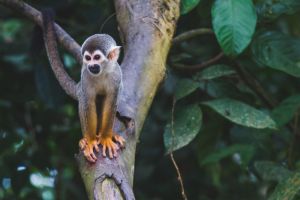
A review of the most recent data submitted to CITES for 2017-2021, revealed that 7,209 live native non-human primates, almost all captured in the wild, were exported from South American countries. The main countries to export were Guyana and Suriname, with others being Venezuela, Brazil and Peru. The most common species exported were squirrel monkeys (Saimiri sciureus), capuchins (Cebus apella; Cebus olivaceus) and tamarins (Saguinus midas). Many were sold for commercial trade, and it is feared that they may have ended up in the 'pet', 'entertainment' or laboratory trade.
Guyana exported the greatest number and variety of species; the most common being the Guianan squirrel monkey (3,616), followed by the tufted capuchin (976), the wedge-capped capuchin (324) and the golden-handed tamarin (223). The most common species exported by Suriname was the Guianan squirrel monkey (1,160) followed by the tufted capuchin (226). All exports from Guyana and Suriname were recorded as wild-caught.
The main country to import non-human primates from South America between 2017-2021, was China (4,682), followed by the USA (828) and Thailand (508). China is renowned as a major user of non-human primates for research and toxicity (poisoning) testing. It is also renowned for keeping various species of wildlife, including primates, as 'pets' and using them in 'entertainment' venues. Thailand occupies a major role in the global wildlife trade, and the demand for 'exotic pets' within the country has been well documented. The Guianan squirrel monkey was the main species imported by the USA. In 2019, Venezuela reported exporting 269 wedge-capped capuchins to the USA for 'scientific' purposes.
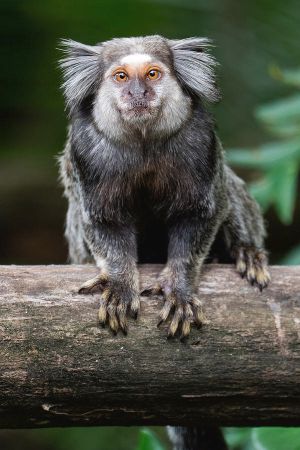
There is also an extensive global trade in non-human primate blood and serum and other tissues from South America. This involves multiple species, reported primarily as being wild-caught, and exported for 'scientific' purposes. Between 2017-2021, Brazil and Peru were the greatest exporters of these bodily products.
It is alarming that many countries still allow the cruel exploitation of their native monkeys and continue to grant CITES export permits for those captured and torn from their families and natural habitats. Equally disturbing is that countries continue to import wild-caught monkeys, despite major welfare issues and the negative impact on wild populations.
Wild native non-human primates also face many threats from a domestic trade that can include their capture to be kept or sold as 'pets' or for 'entertainment', for laboratories and breeding facilities or for human consumption. The extent of this domestic trade is not known as such data are not included in the CITES trade database.
One example of the result of domestic trade involved Brazil. Wild black-tufted marmosets (Callithrix penicillata) living freely in the forests of Brazil, were captured by the Brazilian Institute of Environment and Renewable Natural Resources, and "donated" to the Universidade Federal de Minas Gerais (UFMG) where they were used and killed in tests for an "anti-cocaine vaccine" (see our news report for more information).
An article by Action for Primates, reporting on this disturbing trade in thousands of monkeys out of South America, has been published in Biodiversity MAG, the online magazine of the International Conservation & Biodiversity Team (ICBT). Click here for access to the article. The entire issue can be accessed by clicking here.
13 January 2024: Cruel use of snow monkeys in Japan to study human gambling addiction

In an effort to understand how human gamblers make their choices, snow monkeys (also known as Japanese macaques) suffered extensively and were killed in a disturbing experiment at Kyoto University, Japan (Sasaki et al 2024). The procedures were approved by the Committee for Animal Experiment at the Graduate School of Medicine
.
Six adult Japanese macaques were used (four were female, two were male) in this research to study the underlying neural mechanism of gambling disorder in humans
. They were subjected to highly invasive surgery in which their scalps were cut open and an injection chamber attached to the skull, and the skull opened and electrodes placed directly onto the brain. In some, a toxin was injected into the brain in order to temporarily cause loss of function in a specific region. A marking agent was also injected.
In addition, head posts were attached to the skulls in order to later severely restrain the macaques' heads in a fixed position during training
and recording sessions. Eye movements were used to indicate whether the macaques preferred high risk-high return rewards or low risk-low return rewards. The researchers stated that water was used as a reward. Monkeys would not normally consider water to be a 'reward'. We have to assume, therefore, that there had to be fluid or water deprivation sufficient in degree to make them thirsty enough to 'work' for a few drops of water.
The macaques had to endure laboratory conditions and invasive brain surgery, with their lives completely controlled – coerced into 'working' for water rewards – before being killed in order to get their brains for further study.
Gambling is an addiction, and, like other addictive disorders in humans, is complex, and influenced by many variables such as social, environmental, economic, cultural, psychological and biological. The researchers stated that they were trying to determine how the macaques made a decision
when choosing between a high or low chance of getting a reward and compared this with more pathological forms of risk-taking decisions manifesting as gambling disorders
. Using macaques as surrogates in an attempt to study gambling disorder in humans is not just immensely cruel, it is also irrelevant to people. By stating that only future studies will reveal whether this state in primates is comparable to that in patients with gambling disorders
, the researchers themselves admitted that their findings may have no relevance to humans with gambling disorders. There are, however, ethical studies in human volunteers which provide the kind of information being sought. The only way to learn about human conditions is by channelling financial and intellectual resources into studying humans.
Reference:
7 January 2024: Infant marmosets killed in inhumane parental deprivation research in Japan

Demonstrating a remarkable lack of compassion, researchers removed newborn common marmosets from their mothers (and fathers) in order to study the effects of parental deprivation and human hand-rearing on brain development (Shinohara et al 2024). The experiment was carried out at the Central Institute for Experimental Animals in Japan, and was approved by their animal use committee.
The marmosets were bred at CLEA Japan, an animal supply company, and reportedly involved litters that contained more than two infants. Six marmosets were removed from their mothers soon after birth. They were placed into individual cages in a separate animal room, ensuring no visual or auditory contact with their parents
, and hand-reared by staff. After 4 weeks, these infants were group housed. Five other marmosets were allowed to be reared by their parents until they were about 11 months old. They were then removed from their parents and, along with the six who had been deprived of their mothers after birth, were killed in order to get their brains for further study. The researchers found that there were changes in brain biochemistry, which would have made the marmosets susceptible to brain diseases.
What is particularly tragic is that the researchers were aware that hand-reared marmosets exhibit behavioural abnormalities, including abnormal vocalisations, excessive attachment to the caretaker and aggressive behaviour. Despite this, the researchers carried out the experiment, undeniably causing great suffering and distress by cruelly depriving not only the infants of their parents, but also the parents of their infants.
Research using non-human primates involving maternal deprivation has been taking place for decades. Such research in non-human primates – and the recognition of the lasting behavioural and psychological harms it causes – has been widely condemned, including that currently being done using rhesus macaques at Harvard Medical School in the USA (https://animal.law.harvard.edu/news-article/cruel-monkey-experiments/).
Reference:
![]()
![]()
![]()
![]()
![]()
Contact us via E-mail
Copyright © 2020-2026 Action for Primates. All rights reserved.